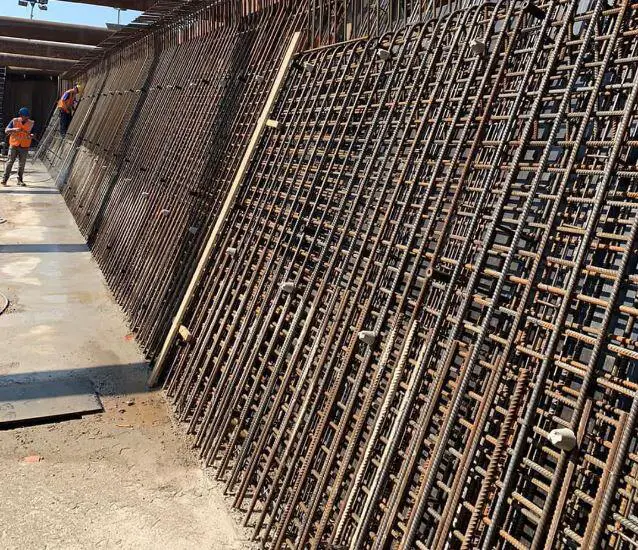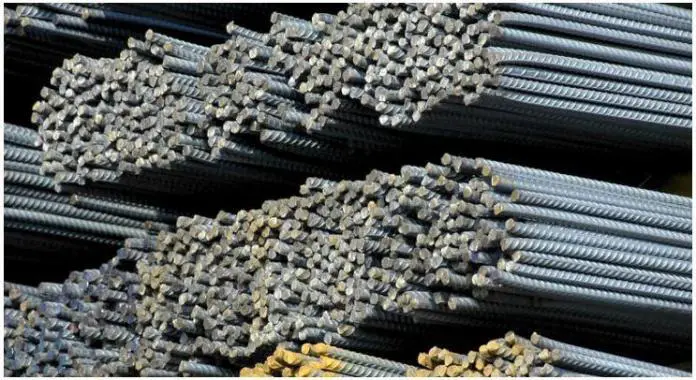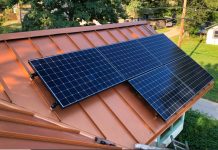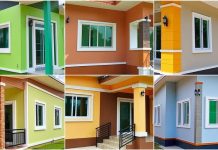Nigeria’s reinforcement market is usually categorised into ‘local’ and ‘foreign’ reinforcements which are priced differently in the market. Local reinforcements are manufactured in the country, while foreign reinforcements are usually imported into the country from Germany, Ukraine, and Russia. Different researchers and quality control agencies have often reported low quality of reinforcements manufactured in the country, which usually fail to meet the standards required for reinforcing steel. Due to the problems of quality assurance of reinforcements in Nigeria, most structural engineers in Nigeria use yield strength of 410 MPa in reinforced concrete design (using BS 8110-1:1997).
However, in the middle of local and foreign reinforcements in Nigeria are the Thermo Mechanically Treated (TMT) reinforcements. TMT reinforcements are currently produced worldwide on a large scale for high strength steel. They are usually manufactured using recycled metal scraps.
TMT reinforcements are characterised by their softer inner core, and hardened outer core, and are manufactured by a process called Thermo Mechanical Treatment. This process combines plastic deformation processes such as forging, rolling, etc with thermal processes like heat treatment, water quenching, heating, and cooling at various rates into a single process. During the cooling process of TMT reinforcements, the inner core remains red hot, while the cooled outer surface gets auto tempered due to heat flow from the core to the surface, and turns the outer surface into a hardened martensitic layer.

A recent research carried out in Nigeria have shown that TMT reinforcements can change the face of design in the country, given the gradual switch of design code from BS 8110-1 to Eurocode 2. Researchers from Nnamdi Azikiwe University, Awka, tested the mechanical properties of 70 samples of TMT reinforcements produced by four different companies in the country. The reinforcements tested were;
- Tiger TMT – African Foundries Limited
- TMT Shield – Landcraft Industries
- Rock TMT, and
- Real TMT – Quantum steel Nigeria
The diameter of reinforcement tested ranged from 10 mm diameter to 25 mm diameter. The research was published in the Journal of Science and Technology Research.
Out of the 70 samples tested, 91.5% met the required characteristic strength of 500 MPa (Eurocode 2, UK), and the percentage elongation at fracture satisfied all the requirements of BS 4449:2005. The mean yield strength of the samples was found to be 532.8 MPa with a standard deviation of 24.926 MPa, and coefficient of variation of 4.678%. The probability of the samples tested falling below the yield strength of 500 MPa was found to be 9.4% with a reliability index of 1.316. However, the ultimate tensile strength to yield strength ratio (Rm/Re) of the samples were found to be averagely high (with a mean of 1.356 and a standard deviation of 0.095).
According to the authors,
Design engineers are free to decide on the characteristic value of yield strength to use for design, since Eurocodes permits the use of yield strength ranging from 400 – 600 MPa. Manufacturers should however follow the recommendations in clause 8.2.2 of BS 4449 for assessment of long-term quality level of their characteristic strength… Future work should involve extensive testing of the chemical properties of TMT reinforcements produced in Nigeria, to see how they impart on the mechanical properties. Subsequently, reinforced concrete designers in Nigeria can confidently use fyk = 500 MPa, and a material factor of safety of 1.15 at ultimate limit state (design strength = 0.87fyk = 435 MPa) provided TMT reinforcements have been specified.
The mechanical properties of TMT reinforcements as reported in the study will therefore likely change the way designers specify reinforcements during designs. It is obvious that any design done using fyk = 410 N/mm2 will be more expensive than design done using reinforcement of yield strength, 500 N/mm2. Reinforcement dealers in Lagos are complaining that the demand for foreign reinforcement has reduced as more attention is being paid to TMT reinforcement by top construction companies. It will be interesting to see how TMT reinforcements will influence the construction market and design standards in Nigeria in the nearest future.
Reference:
Ubani O.U., Okonkwo V.O., Osayanmon O. (2020): Variability of Mechanical Properties and Reliability of Thermo Mechanically Treated Reinforcements in Nigeria. Journal of Science and Technology Research 2(1):1-12
To download the full research publication and findings, click HERE










